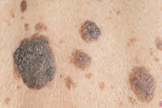Causes for Seborrheic Keratoses

Tom is a 64-year-old male in the office for his routine skin exam. He does not have any concerns, but his wife was worried about 4 brown irregular spots on his back. I tell him that he is lucky to have a wife that “watches his back” for him. Teasing aside, I do recommend to patients that partners keep an eye on each other’s back since that is the most common area for a melanoma to develop for males.
I examine the spots on his back and find 10 more similar growths on his arms and abdomen. The spots are brown, black, light tan, waxy, scaly and slightly raised oval growths that are from.5 to 1.5cm. They appear to be stuck or pasted on his skin.
I explain to Tom that these lesions are the most common benign (harmless) growths we find on skin examinations. They become more numerous as you get older. One study found that 88% of people over 64 years old have seborrheic keratoses. Fellow dermatologists I have worked with in the past referred to them as “barnacles” and “spots of wisdom.” I prefer the later, of course. I would rather think of myself as getting wiser and not like an old pier at the beach.
I continue to tell Tom that these lesions are not necessary to treat since they are benign, but you can choose to have them off for cosmetic reasons. His options are cryotherapy (freezing) or shave removal depending on the location and size. None of the spots seemed to bother Tom so he decided that no treatment was best for him.
The reason people get seborrheic keratoses is not fully clear. There is thought to be a component of genetic inheritance with a greater chance with increased sun exposure (another reason to wear sun screen), or other unknown factors that causes a mutation in a gene affecting increased growth of the top layer of skin cells.
Even though these lesions are benign, they are sometimes difficult to differentiate them from melanoma skin cancer. They are both varied in color, shape size and can grow and change. It is recommended if you do have lesions like this or any others that you come in for a thorough skin exam once a year. We can help differentiate the barnacles from the bad ones.
